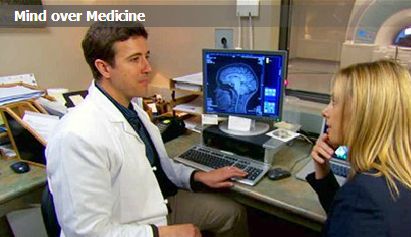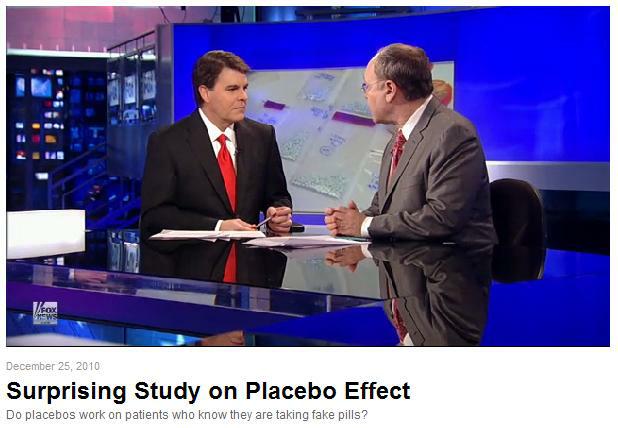
More placebos in the media, this time from Australia’s 60 Minutes.
"We have in our minds, in our brains, the capacity to change the way we experience pain, to affect some of the illnesses that bring us in to see physicians. What we need to do is learn how to unlock those capacities and make use of them."
From Howstuffworks
"Here’s where it gets crazy … (the incidence of) the placebo effect itself is increasing."
"Approximately half the drugs that fail in late stage trials fail because they simply can’t outperform placebos".
Australia’s Sun-Herald newspaper referred to us in a general article on the placebo effect. Placebos: the future of medicine?
We also made it into Body & Soul magazine (in an article that looks quite similar).
America’s 60 Minutes on ‘Depression and the Placebo Effect’
From PLoS ONE
Placebos administered without deception may be an effective treatment for IBS [Irritable Bowel Syndrome]. Further research is warranted in IBS, and perhaps other conditions, to elucidate whether physicians can benefit patients using placebos consistent with informed consent.*
Source the article here.
* Kaptchuk TJ, Friedlander E, Kelley JM, Sanchez MN, Kokkotou E, et al. (2010) Placebos without Deception: A Randomized Controlled Trial in Irritable Bowel Syndrome. PLoS ONE 5(12): e15591. doi:10.1371/journal.pone.0015591
Great summary of placebo effect(s), amusing, sharp and provocative. A great way to spend three minutes!
Here’s an article from a blog called PRACTICAL ETHICS (Ethics in the News) at the University of Oxford. It’s pretty unfriendly to homeopathy, which we think isn’t quite as cut and dried a domain of practice as the author, Bennett Foddy, assumes. Brian, one of our founders, is happy to advise on both homeopathic and placebo regimes. That’s one point where we differ substantially with Foddy, and at least some of the literature does as well. Buying placebos from Boots, government subsidised or not, makes at least the ‘pleasing the practitioner’ script impossible. ("Pleasing the practitioner" is the idea that a patient’s trust in the authority of an expert induces the placebo effect.)

Here is an approach you may like to consider, to help you benefit from the mysterious healing powers of the placebo, even when you know it is a placebo you are taking; an approach that has been useful for a growing number of people in recent times, recommended by a homeopath of some 30 years experience.
Consider this . . . undoubtedly, there is a greater chance of success if the placebo taker believes it can work, and even more if the placebo taker trusts and has faith in the prescriber (which paradoxically can be themselves).
The simple mathematics around the mysterious healing powers of the placebo reveals an improvement in at least 30% (and up to 70%) of cases. You can be one of the 30-70%.
Our aim at universal Placebos is to help you shift from curiosity to action – to dare to try something new.
What would convince you to use a placebo? If you are curious you could try this simple procedure to evoke the positive qualities of Acceptance, Gratitude, Faith, Trust and Action.
Twice a day, say morning and night, take 3 placebo pilules.
With the first pilule focus on acceptance of who you are and where you are, all your advantages and disadvantages, strengths and weaknesses. Accept your true situation, so you are free to respond, and not just react.
As you take the second pilule focus on gratitude. Be thankful for all the positives you have in your life . . . “it could always be worse.” Be mindful of where you want to be. Have faith you will find inner guidance. . . just trust it, that these inner revelations are right and correct.
As you take the third pilule, just say YES . . . it feels better. Smile and go . . .take action with the first step, whatever that is . . . and believe it is possible.
Or, why not create your own ritual? Here are some tips:
(a) Apply KISS tactics (keep it simple sweetheart)
(b) Choose easy times to take placebos, like when you have a cuppa
(c) Take it at least twice a day, morning and night
(d) Be mindful and present in the moment
(e) Keep it short and easy to complete
The truth is that the successful outcome of any healing situation is determined by the actions and choices and healing system of the individual, regardless of the healing modality. Nobody can make anyone else better, but everyone needs some help sometimes.
 You know you’ve made it when they run a story on Fox News. Forget Harvard (where the groundbreaking placebo study took place that allowed patients to KNOW they were trialling placebos). The Harvard study told participants the ‘medication’ they were taking was inert, however it ‘would engage the mind-body and self healing thing’.
You know you’ve made it when they run a story on Fox News. Forget Harvard (where the groundbreaking placebo study took place that allowed patients to KNOW they were trialling placebos). The Harvard study told participants the ‘medication’ they were taking was inert, however it ‘would engage the mind-body and self healing thing’.
Marc Siegel, from something called the ‘Fox News Medical A-Team’, comments on video here.
In other news, the more mainstream Wall Street Journal comments on the research here and here.